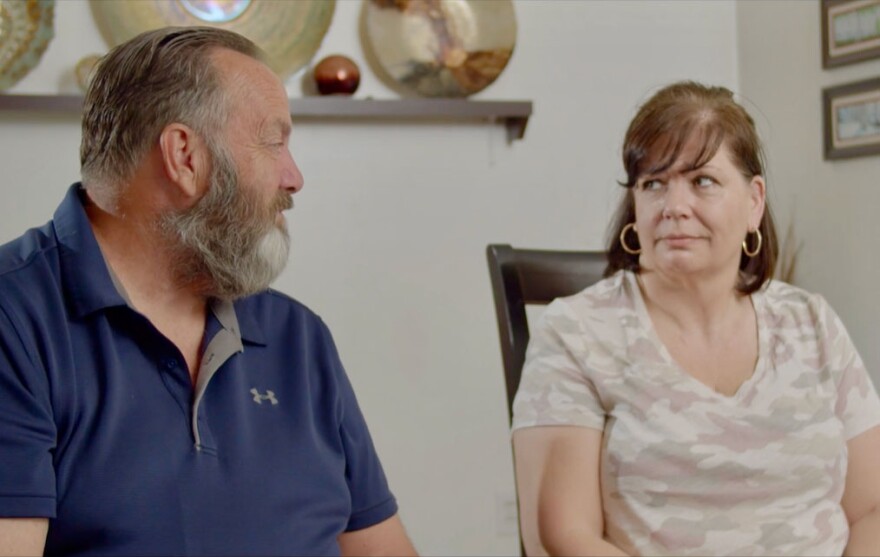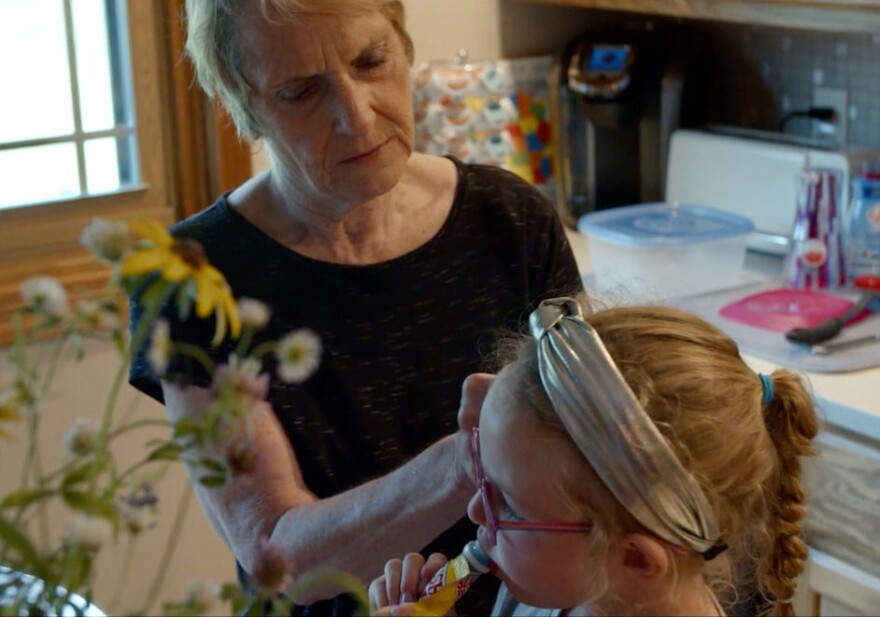In Vermont, it’s estimated that more than 6,000 kids live with grandparents, extended family or close family friends.
There’s a term for it: kinship care.
Many of the people stepping in to parent are older, and child care advocates say many don’t know about the financial aid and services that are available to them.
Two nonprofits that provide support for these families have just released a new documentary to address that, called The Kinship Experience.
The film begins with a school bus rolling to a stop in St Johnsbury. It drops off a small boy in a wheelchair. His name is Alexander, and his grandmother Kelly Donoghy is waiting for him.
“Alexander came to live with us when he was 4," Donoghy explains. "He was born with several disabilities that require him to have full-time care.”
She says her son and Alexander’s mother were unable to provide a stable home for him.
“He needed more consistency, somebody to take care of him full-time,” Donoghy said.
In the documentary, you see Kelly and her husband Kenneth helping Alexander eat, dress and do other daily tasks.
There's an emotional scene where the couple are sitting at their kitchen table, recalling how all of this started for them. It was eight years ago, and their grandson hadn’t been enrolled in school and wasn’t receiving important medical screenings and care. The state got involved, and Alexander was put into foster care.
Kenneth picks up the story, looking over at his wife. "There was another meeting, wasn’t there? And Kelly looked at me and I looked at her and… we stepped up."

The film highlights the rewards of kinship care, but also the emotional, logistical and legal challenges many kinship families in Vermont face.
Essex Junction residents Lynn and Robert Messier, for instance, are raising their great-granddaughter Alina. Lynn says Alina’s parents were incarcerated, and other relatives were unable to help. So, they stepped in.
“Your life changes completely," Lynn said. "It’s not about you anymore, and your freedom. It’s about caring and giving all your love and attention to a child who’s going to need it. You want her to succeed in life, so you want to give her the good values of life.”
Lynn says she was determined, but it was hard. In the film you see Alina skipping down the stairs and somersaulting across the living room carpet, doing what 6-year-olds do.
"It’s not about you anymore, and your freedom. It’s about caring and giving all your love and attention to a child who’s going to need it. You want her to succeed in life, so you want to give her the good values of life.”Lynn Messier, caring for great-granddaughter Alina
Lynn says parenting a young child again in her 70s was overwhelming at first, and isolating. Then a friend told her about Vermont Kin as Parents, or VKAP, as she calls it. It’s a nonprofit that provides information, support and other services to caregivers like her.
VKAP and another nonprofit known as COVE, Community of Vermont Elders, produced the film to raise awareness of kinship care relationships and create more connections among providers.
Lynn says she took part in the documentary because she wanted to let others like her know help is available.
“I want people to know that they’re resources out there for us that they might not even know exist," she said.

Kinship relationships are nothing new. Families have been stepping up to care for loved ones as long as there have been families.
But filmmaker Mara Brooks, who works for COVE and VKAP, says what people may not realize is what that kind of care means to a child.
“I actually was a kinship care kid," Brooks said. "I spent several years living with my best friend’s family when I was a child, because my homelife was very chaotic.”
Brooks believes the stability of her friend’s family saved her life and helped her finish school and be the person she is today.
“My brother, who did not have a family to go to, and, you know, did not have any escape, so to say, he ended up in prison when he was 23.”
Research shows that children raised in kinship care relationships feel more connected and do better than those who are placed in foster care. Brooks says that’s something they wanted the film to highlight.
“You know, this is something that happens far more often than foster care, yet people aren't really aware of it; they don’t know what it’s called," she said. "And the kinship care providers are not getting the support that they need as a result."
"[T]his is something that happens far more often than foster care, yet people aren't really aware of it."Mara Brooks, "The Kinship Experience" filmmaker
Barbara Joyal is system of care manager for Vermont's Department for Children and Families. DCF is the state agency that oversees child welfare and foster care.
Joyal works closely with VKAP, and she says when a child is removed from a home, her agency checks first to see if a family member can take in the child.
Because, she says, it's just better than placing a child in foster care, or what some call stranger care.
"I mean, how would you explain that to a 4-year-old, like, you're gonna go stay with these nice people over here for a while," Joyal said. "That is just a very strange occurrence, versus: ‘You're gonna stay with grandma. And she's going to take care of you.’ You know, that transition is much less traumatic.”
Joyal says kinship care providers who get licensed with the state qualify for the same financial benefits and support services that foster parents do. Those reimbursements, she says, range from $17 to $25 a day per child. There's also oversight.

But she says lots more people provide care informally without involving DCF.
That’s what Lynn Messier and her husband did. They're the couple profiled in the film who are raising their great-granddaughter. Lynn says they worked with an attorney to get temporary guardianship of the child, who was living in New York state at the time.
But because they didn’t work with officials in Vermont or VKAP, Lynn says they didn't know about services and benefits that they qualified for.
Joyal says according to national data, for every one licensed foster parent, there are 18 informal guardianships. And she says those caregivers often struggle to navigate complicated family dynamics.
“There are legal decisions that need to get made," she said. "Who's going to enroll the kid in school? Who has permission, you know, to get that child medical care? Who's going to make a decision about family contact, visitation, all of that? Those things become very, very overwhelming for a grandparent or an auntie or an uncle to navigate.”
Joyal hopes the new film will encourage more caregivers to get licensed and take advantage of the help that’s available.
The film The Kinship Experience can be streamed by clicking here.
Have questions, comments or tips? Send us a message or get in touch with reporter Nina Keck:





